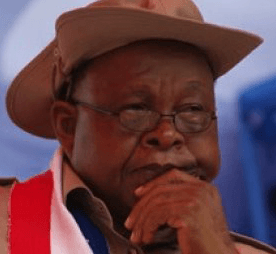Proliferation of districts poses danger to local government – Speaker

The proliferation of districts poses a danger to local government and decentralisation, as they tend to strengthen the central government’s strong hold over the districts, Professor Mike Oquaye, Speaker of Parliament, has stated.
He described the situation as a form of balkanisation (the division or fragmentation of a state or region into smaller, often ethnically similar places); adding that “and we need to talk about anti-balkanisation to achieve political aims as we also come to re-examine how to strengthen local government”.
He said this would be best done constitutionally else every discretion used would lead to the creation of loopholes.
“All these are areas that I believe would help us to appreciate the pro-parameters within which we would need to have district governance re-examined in our country. Not only by way of whether you should bring political parties or not? As for the political parties, it is just natural training grounds for future politicians from districts to regional and national levels,” he said.
“Nevertheless all other allied matters that would go to strengthen the system as a real countervailing authority is really the area I am particularly much interested in. Because merely bringing political parties to district assemblies would not do anything for decentralisation.”
Prof Oquaye said this on Wednesday at a national Civil Society Organisation (CSOs) forum, organised by the Institute for Democratic Governance (IDEG) on the theme: “CSOs’ Role in Transformational Local Governance Reform in Ghana”.
Records has it that in Ghana, the number of Metropolitan, Municipal and District Assemblies (MMDAs) increased from 65 in 1992 to 110 in 2004, and further to 216 in 2016; whilst the number of constituencies grew from 200 in 1992 to 230 in 2004 and went up to 275 in 2016.
And 2018, the government again added 38 new MMDAs; thus scaling the number up to 254.
The forum, was therefore, organised to enable participants to share their views on how to educate the public and mobilise their participation in and support for a successful implementation of the recent decision by President Nana Addo Dankwa Akufo-Addo, to amend Article 55 (3) of the 1992 constitution to allow for political parties participation in district assemblies elections.
Prof Oquaye said political analysts have lost considerable sight of the fact that decentralisation is essentially a power-sharing mechanism.
He described it as the establishment of countervailing authority and a liberative sense of local autonomy and self-governance.
“The English say that all roads cannot lead to Whitehall or to 10 Downing Street. They also say that from the cradle to the grave, the local council is the essence of life,” the Speaker said.
He said the local council takes care of health, education, sanitation, police and all the real basics of life.
“In the USA, not only do they strengthen mayorial authority, but also gives wide autonomy to the states that form the union, such that to the Dallas resident, the state government is the essence of life from birth to dead,” he said.
Prof Oquaye said: “The tragedy of the Ghanaian situation is the manipulation of the decentralisation process, including the balkanisation of assemblies for political gain resulting in the political fragmentation of the districts”.
“We have nothing but a divide-and-rule semblance of decentralisation. In order to share power, we have re-delineate the assemblies into viable entities and give them real autonomy,” he added.
In order to strengthen the assemblies as a real countervailing authority, Prof Oquaye recommended that district assemblies should elect all their members and that the one-third nomination by the executive be scrapped.
He suggested extending the political party system to the district assemblies.
Furthermore, he recommended that certain percentage of seats at the district assemblies be set aside for women alone to contest to promote affirmative action at the local level.
Mr Kwasi Boateng Agyei, a Deputy Minister of Local Government and Rural Development, said government had rolled a comprehensive road map for the implementation of the election of metropolitan, municipal and district chief executives (MMDCEs) by 2021.
He said currently pre-referendum activities was going on across the country, which would culminate in the referendum in September 2019.
Dr Emmanuel Akwetey, Founding Executive Director, IDEG, commended President Nana Akufo-Addo for the strategic and courageous decision on the amendment of Article 55 (3) by 2019.
“We urge all stakeholders to support the effective and timely implementation of this momentous decision in both Parliament and the national referendum,” he said.
He said the amendment of the Article would strengthen democratic stability, developmental governance and accelerate transformational and inclusive local economic development.
Source: GNA
